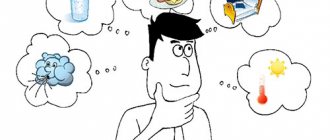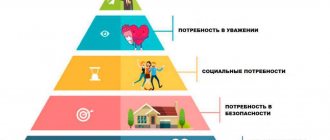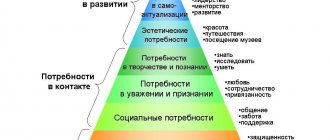What classification of physiological needs exists: examples of manifestation in humans
Achievement orientation implies demands to be stronger, more responsible, smarter, and to have the best-paid job. Sometimes, in order to achieve as much as possible, a person puts biological needs in the background, forgetting to fulfill them. But unfortunately, there are cases when they push aside not only their own needs, but also the needs of their children, enrolling them in various clubs from birth: music section, drawing, dancing. The result of such haste may be failure to eat or rest. This will lead to the manifestation of psychological disorders.
Nutrition
Food brings energy, pleasure, and satisfaction to the body. A refreshed person is more balanced and cheerful than a hungry person. Having the opportunity to have a snack is not enough; it is necessary that the food be high in calories and harmless. If an individual is engaged in physical labor and often attends training, he should consume as many calories as possible, and those who carry out activities through mental labor should consume less. The need is considered satisfied if the diet contains enough nutrients to lead a normal life, without quickly getting tired and without exhausting the body.
Digestive functions:
- Filling the body with the necessary beneficial elements that help maintain vital activity and produce new cells.
- Providing energy for the struggle for existence and an active lifestyle.
- Transferring information to maintain connection with nature.
In the history of mankind, hunger and thirst are the causes of wars and the formation of nomads, but we know this only from textbooks. Currently, another problem has arisen - diet pills that reduce appetite; the desire of girls to become thin, which leads to anorexia.
The human body is designed this way: in order to avoid a lack of essential carbohydrates, it focuses on preserving energy reserves, turning them into fat deposits, which retain beneficial properties in the organs. During a prolonged fast, the body will use stored reserve substances so that the person can exist for some more time.
What are biological needs?
Physiological needs play a huge role for everyone. The essence of the so-called biological needs of a person is the satisfaction of “basic things”. Something that has a close and constant connection with the body of the face.
Satisfying such needs is fundamental to life. Due to this feature, personal support and development is ensured. This includes a variety of processes. For example:
- breath;
- nutrition;
- drinking liquid (water);
- rest;
- dream;
- movement.
But there are also more complex “manipulations” that at first glance may not seem vital. These include the needs for safety, balanced and high-quality nutrition (and not just any kind), thermal comfort, procreation, treatment, and receiving quality medical services.
Important: protection from diseases and other ailments is also a standard biological need.
The category in question is at the very top of Maslow’s pyramid of needs. It is recommended to pay attention to what a person is able to “stretch”:
- 3-5 minutes – in a lifeless state;
- 4 days – lack of sleep (in principle, not necessarily full sleep);
- 7-10 days – without liquid;
- up to 45 days – hunger strike.
This is something that is common to all living beings. They can be called natural, physiological, biogenic and organic. In some circumstances the name “vital” (from the word “vita” - life) is found.
Interests and inclinations
Interests arise based on needs.
Interest
- a person’s purposeful attitude towards any object, the desire to become familiar with new facts about it, to study it more completely and deeply.
People's interests are directed not so much at the objects of need, but at those social conditions that make these objects more or less accessible, first of all, material and spiritual goods that ensure the satisfaction of needs.
Interests are determined by the position of various social groups and individuals in society. They are more or less recognized by people and are the most important incentives for various types of activities.
Sometimes interests develop into hobbies of life or become its meaning. In the process of satisfying some interests, a person often acquires new ones, which gives him the opportunity to constantly improve.
There are several classifications of interests :
- by focus:
social, economic, political, spiritual; - by degree of community:
individual, group, public; - by content:
direct (interest in the process of activity itself), indirect (interest in the results of activity); - by the nature of the subject
: national, state; - by level of activity:
passive (limited to the perception of the object of interest), active (a person acts in order to obtain the object). - if possible, their implementation
: real, imaginary;
When considering the concept of “interest”, we must compare it with the concept of “inclination”, since they are the result of a person’s need for a certain activity. Interest is a person’s focus on an object, and inclination is an activity. For example, when they say that a young man is interested in football, they mean that he likes to watch football matches, collects information about famous football players or teams, and when they say that a young man has an inclination towards football, this means that he plays football well.
Addiction
- focus on a specific activity.
A person’s interests and inclinations express the direction of his personality, which determines his life path, the nature of his activities, etc.
Interest is not always combined with inclination (much depends on the degree of accessibility of a particular activity). For example, a person's interest in cinema does not necessarily entail the opportunity to work as a film director, actor or cinematographer. But interest in chess arises along with the inclination to play it.
A person’s interests express the direction of his personality, which largely determines his life path, the nature of his activities, etc.
↑ Pyramid of needs by A. Maslow
Of the many different classifications of needs, the most popular is the hierarchical (
hierarchy is the placement of elements from lowest to highest) pyramid of psychologist Abraham Maslow.
PRIMARY (INGENATE) NEEDS
The first two stages are primary or congenital,
since if these needs are not satisfied, a person will not be able to engage in other activities, and all his aspirations will be aimed at realizing precisely these needs.
For example, if he is hungry, then all his thoughts, desires and actions will be about food. A person's life depends on it. Such needs include physiological
and
existential . Physiological needs
are essential for survival. These include the needs for food, water, respiration, shelter, rest and reproduction.
Existential
include needs for security and confidence in the future include needs for protection from physical and psychological dangers from the outside world and confidence that physiological needs will be satisfied in the future.
SECONDARY (ACQUIRED) NEEDS
All other needs A. Maslow defined as secondary or acquired.
Social
needs or needs for belonging and love, for social connections, affection, caring for another person and attention to oneself, participation in shared activities.
Prestigious
or, in other words, the need for self-esteem, evaluation or respect from other people, recognition, success and appreciation, career growth.
Prestige
is a measure of society’s recognition of a person’s merits.
Every person, to a greater or lesser extent, has a need for competition, a desire to stand out, to be better than someone else, and to be respected by others. Therefore, the desire to achieve a higher position in society, to enter prestigious, popular faculties, to make a career, to achieve prosperity - these are prestigious needs.
The following three types of needs (cognitive, aesthetic and spiritual) are the aspirations of the “soul” and are considered the highest human needs.
Cognitive needs
- this is a study of the surrounding world, reality in order to obtain new knowledge, impressions, and the desire for purposeful creative activity.
They are also called cognitive needs .
Aesthetic needs
- this is a person’s spiritual desire for harmony and beauty, art and creativity. Thanks to these needs, the world has theaters, exhibitions, museums, art galleries, ballet, music and dance.
At the topmost step are spiritual needs
or the need to realize one’s potential and grow as an individual
(self-development, self-improvement)
.
Realizing his needs, the individual builds his life in accordance with them.
The needs of lower levels require satisfaction and, therefore, influence human behavior before the needs of higher levels begin to affect motivation. At any given moment in time, a person will strive to satisfy the need that is more important or strong for him. Before the next level need becomes the most powerful determinant of human behavior, the lower level need must be satisfied.
«When the strongest and most priority needs are satisfied, the needs that follow them in the hierarchy arise and require satisfaction. When these needs are satisfied, a transition occurs to the next step in the ladder of factors that determine human behavior.
" Psychologists K. Hall and G. Lindsay
If basic needs are not realized, then they are replaced by pseudo-needs
, for example, the need for luxury goods, alcohol, gambling, etc.
One should remember about reasonable limitation of needs, since, firstly, not all human needs can be fully satisfied, and secondly, needs should not contradict the moral norms of society.
Reasonable needs
- these are the needs that help the development in a person of his truly human qualities: the desire for truth, beauty, knowledge, the desire to bring good to people, etc.
Imaginary needs
- artificially created by man, the implementation of which can be dispensed with (for example, smoking).
Since with the development of a person as an individual his potential capabilities expand, the need for self-expression can never be fully satisfied. Therefore, the process of motivating behavior through needs is endless.
A person experiencing hunger will first seek to find food, and only after eating will he try to build a shelter. Living in comfort and security, a person will first be motivated to activity by the need for social contacts, and then will begin to actively strive for respect from others. Only after a person feels inner satisfaction and respect from others will his most important needs begin to grow in accordance with his potential. But if the situation changes radically, then the most important needs can change dramatically. Needs underlie the emergence of interests and inclinations.
Basic human needs
Basic needs represent everything without which a person cannot exist. And we are not talking about “increased comfort” at all. Primarily physiological aspects are implied. They vary depending on the individual's personality and temperament.
For example, if we talk about the need to eat food, you can notice: for a normal life, someone needs to “constantly chew something,” while someone gets full from a few spoons of salad. This is normal.
With the development of the population, basic needs began to include not only biological, but also such aspects as wearing clothes and shoes. Individuals may include the need to be alone with themselves in order to calm down, find harmony with the world and restore strength. For some, the “base” is communication. But there are also those for whom daily training (sports) or certain other activities are extremely important. Without them, a person begins to feel unwell on a physical level.
Important: from the above it follows that individuals have the opportunity to have an individual set of basic needs. But they all necessarily include “physiology”.











